Blog
Remembering the days when the good guys were good guys, and the bad guys were bad guys
As South Africa heads into its darkest days since democracy in 1994, I want to be reminded about the heroic struggles that led up to 1994. In January someone sent me a wonderful birthday present – a video clip from those days that includes a interview with me about the dynamics of the democratic transition that followed the release of Mandela. This forms part of the African Activist Archive that is full of clips from that era – worth a look if you are feeling depressed about the present.
Masters Graduates 2016
Such a happy and sad day – so happy for these Masters students who are graduating today, but sad I could not be at graduation because I am lying in hospital with a damaged leg after a rookie mistake parking my bike last Monday at the SI before lectures resulting in the bike falling onto my leg causing a wound that went septic a week later. Amazing research done by this group: from far left hand side of the pic: Megan Davies who did her thesis on the role of intermediaries in urban transitions with a case study of Stellenbosch, Nikki Korsten (The Netherlands) who analysed how municipalities can accommodate embedded PV systems into their energy service by restructuring tariff structures also with a case study of Stellenbosch, Cathy Malulu (from Namibia) who looked at sustainable storm water drainage systems, Jay du Plessis who analysed global population growth projections with special reference to African demographics from a sustainable resource use perspective, Gwen Meyer who did part of her research in northern Ethiopia, Marjorie Naidoo who developed a historical analysis of design paradigms during the industrial era and applied that to an understanding of Cape Town’s Design Capital process, Paul Currie who developed the first ever material flow analysis (urban metabolism) of 120 African cities, Eduardo Shimahara (from Brazil) who wrote up a cookbook of local recipes for meals cooked in the Lynedoch EcoVillage as part of a wider analysis of the linkages between soils,food systems and recipes, and Etai Evan-Zahav who did a remarkable piece of ethnography on informal food sellers in Kayamandi (which included working for an informal food seller at his stall). Such extraordinary work, such a celebration of a remarkable pedagogic programme that produces the kinds of activist-researchers that are needed in a world that is rapidly transforming. Their topics and levels of excellence validate our 15 year endeavor to combine intellectually demanding course work, rigorous research methodologies (which in recent years has consolidated around transdisciplinary approaches) and applied transformative engaged and embedded research.
Advisor to the Curator of the International Architecture Biennale Rotterdam – IABR
The International Architecture Biennale Rotterdam kicks off on 23-24 April 2016 in Rotterdam. Prof Maarten Hajer is the Curator, and I am officially designated as Advisor to the Curator. The overall theme is Next Economy – it has been a wonderful experience working with Maarten to conceptualise this ambitious event, and I will deliver a keynote on the 29th entitled Planetary Urbanism. It includes a ‘sub-exhibition’ on African Urbanization that has been co-curated by Prof Edgar Pieterse from University of Cape Town, Tau Tavenga and myself.
Convivial times in the Visual Arts Quad with our masters students and the arts students
Michel Pimbert, Director of the Centre for Agroecology Water and Resilience at the University of Coventry, with Miche and Flora, joined us yesterday for our morning rituals and work in the gardens, and then all our students traveled to Visual Arts Building quad in the afternoon where Miche and Flora curated a beautiful convivial afternoon and evening making soup and baking bread using local organic ingredients. This followed lectures by Luke and Eve on global food systems, reconnections to the soil and what it means to be human in a world facing a food and soil crisis.
My reflections on the day:
Rising up from within
Memories of ancient pasts
When conviviality was just a way of life
Now it has to be art –
Intended, to remind
Curated, to experience
Organised, to happen
All transported in, for making
Ovens, materials, even fire
Who sensed what we’ve lost?
Touch of soil
Food as love
Smells of the fire as place
Conversing without structure
Connections without intent
Sensuality without possession
Discoveries in the everyday
Excitements of solidarity
Happenings, not structures
That’s the sense of place.
And from this arises
Another kind of beauty:
Poised, poignant, delicate
Curious, probing, soft eyes
Relaxed bodies, exposed, flowing
Unguarded faces
Rippling lightnesses of unorchestrated laughters
Curiosities of the aroused
Blends of beautiful male power –
Moving fire, stoking ovens, chopping wood
With lithe moves of the feminine –
Cutting, serving, tasting, mixing, connecting….
And through it all
Memories surface
Of futures
Where art returns
As way of life
Where all is in place
Nothing brought in
For its just simply there
All can do it
Know-how is passed on
Specialists are not needed
Creating becomes the norm
For in that reconfiguration
Peace prevails
Conviviality thrives
All have a place
Reconnected
And life unfolds
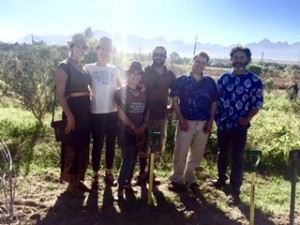
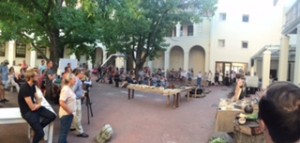
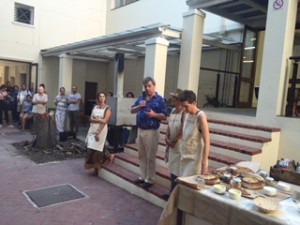
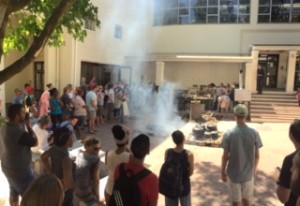
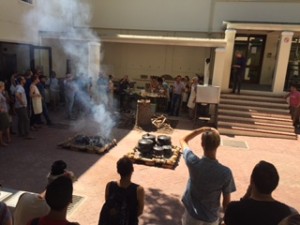
Summer School in Transdisciplinary Research
The 9th Summer/Winter School in Transdisciplinary Research has taken place this week – the pic captures them in all their stunning African colours. They come from all over, and include researchers from Professors to Masters students. All arrived with their research topics to explore with our transdisciplinary research team practical methods for conducting qualitative research using the Sensemaker software. Professor Bagele Chilisa was part the teaching team – the author of the pathbreak book published by Sage called Indigenous Research Methods. To think that this group spent a week at the Sustainability Institute doing a course that synthesized transdisciplinary research, indigenous research methods and the Sensemaker software (developed by the complexity theorist Dave Snowden). A truly remarkable impactful achievement that really captures what will be the core methodological discipline in our newly established Centre for Complex Systems in Transition.
Some of the research topics of the participants (apologies to those I have missed):
green house gasses and air pollution at Julius Nyere airport – Tanzania
impact of denge feaver caused by a certain strain of mosquito – Nigeria
environmental impact of poverty – Nigeria
water quality measurement, water is life – Tanzania
how indigenous music and knowledge is embedded in dance – Ghana (when asked ‘where is your instrument’, he said ‘I am the instrument’)
sustainable agriculture and youth employment – SA
climate change and nature-based tourism – Ghana
how society depends on natural resources – Ghana
environmental sanitation and climate change – Ethiopia
appointment of public prosecutors in SA – SA
corruption in SA – SA
indigenous knowledge research methods, with special ref to HIV AIDS – Botswana
respiratory viruses in children – how to develop an indigenous vaccine – Ghana
fisheries and fishing communities and the impacts of climate change – Ghana
scenic spaces, artistic performance and nature – Ghana
potential traditional nutrient rich crops – Nigeria
food security and local communities – SA
tourism and local communities: sustainable community camp sites- Botswana
international law and international health regulations and non-communicable deseases- SA
public policy and sustainable livelihood with respect to mining – Ghana
values affecting cancer screening amongst women – Botswana
improvement of chocolate flavours – Ghana
cross-border trafficking of drugs and children – Ghana
impact of land restitution on food security – SA
green jobs in the informal economy in informal settlements – SA
rural-urban migration – Mali
talent retention in the Free State goldfields – SA
Reconnecting with Mohamed Halfani and Beacon Mbiba in Addis
A precious moment at the Expert Group Meeting on the Africa Regional position for the Habitat III conference taking place in Quito in October. My old friend from Tanzania Mohamed Halfani is to my left – we met in the 1980s, and worked together on urban governance. He then did five years with the African Union based in Addis and until he retired recently he was at UN Habitat based in Nairobi. Now he is based in Dar, and enjoying not travelling, his children and grandchildren. But does not look a day older than when I first met him. Then there is Beacon Mbiba, who was a youngster back in the late 1980s when we started working with Mohamed and me – then from his based at University of Zimbabwe. Now he is looking very distinguished and based at Oxford Brookes in Oxford, with his family. In the middle is Edlam Yemeru, a dynamic Ethiopian who heads up the urban branch of the United Nations Economic Commission for Africa, and effectively the host of our meeting. Reconnecting and catching up with Mohamed and Beacon is such a great way to start 2016!
Sailing
I returned a few days ago from Plettenbergbay where I did some wonderful sailing on the bay. I’ve been going there since I was 21 (nearly 30 years! – amazing). Like so many Hobie Cat sailors who have sailed elsewhere confirm, the sailing conditions in Plett are ideal. I was inspired to write this poem after a day’s sailing on my boat Thunderchild (see pic). My first Hobie Cat was called Uncontrollable Urge – I have never come across a better name for a boat! And I share a boat with a friend parked at Fishhoek called Born Free – so the names of my boats capture what the poem below is all about! Delight in the freedom!
Sailing – Jan 2015
Cloudy
Hot and humid
Gentle winds
Sailing alone
Always risky,
But a meditation like no other
Just the palm of the breeze
In the sails
The swishing kisses
Of the waters against the hulls
As firm land recedes, with it goes all the cares, anguishes and desires.
We suffer on land
And find freedom on the seas
That’s the real secret of
The ancient mariner.
Mists swirl around the bay
Transforming distant mountains into giants of creation
The swells get higher, steeper
And in the trough, just water all around –
pure utterly blissful silence
Broken only by swishing and the clinks of the boat
A seal breaks surface
Looks curiously, snorts
Ducks and slips away
Reminding me that no
Matter where, we are watched.
As Thunderchild glides further out
The fragility of all life surfaces to my smiles
One small bolt holds up the mast, a tiny plastic plug keeps water from sinking the hulls, a rope thinner than my baby finger keeps up the sails – and all old, breakable and yet that is what I have faith in.
Is this the fragility of life?
The real truth we mask with
Our certainties?
All our beliefs upon which
So much is built –
Just fragility, breakable in
An instant. And then all
Else changes ……
Why are we surprised?
We know how fragile the bolts, plastic plugs and thin ropes are, yet we blame, anger, deny, and wish for another moment.
Would I drift away into the mist?
Sink into the dark waters with their supposed hostile predators?
Float into waves crashing onto the rocks?
Who really cares?
It’s my risk – leave me
To my fragility!
Leave me to my risks!
I roar not ‘cos I want to be heard, but ‘cos no-one can hear me.
I’m free
Only the patterns of nature
Hold me
Go away all land
Keep to yourself what I must carry
I’m no longer there for you
I’m floating now
Free
Sublimely fragile
And just for one absolutely perfect moment I’m fully completely utterly sublimely alive!
South Africa’s Renewable Energy Revolution
My article on South Africa’s renewable energy revolution was published on 4 January in Business Day Live – I wrote it just after Minister Nene was fired by Zuma and the country was experiencing its most gloomy moment since the Marikana Massacre. I wanted to say that other things are happening while we look away, and I also wanted to take a pot shot at the financially insane proposed nuclear programme which is designed exclusively to enrich a few.
http://www.bdlive.co.za/business/energy/2016/01/04/renewable-energy-can-be-the-game-changer

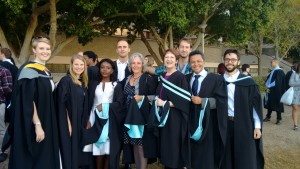
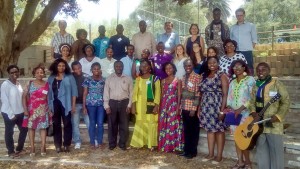
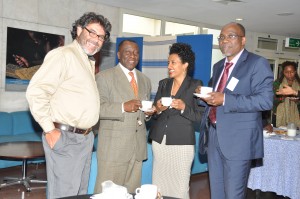
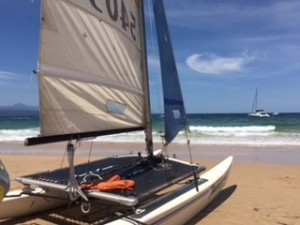
Recent Comments